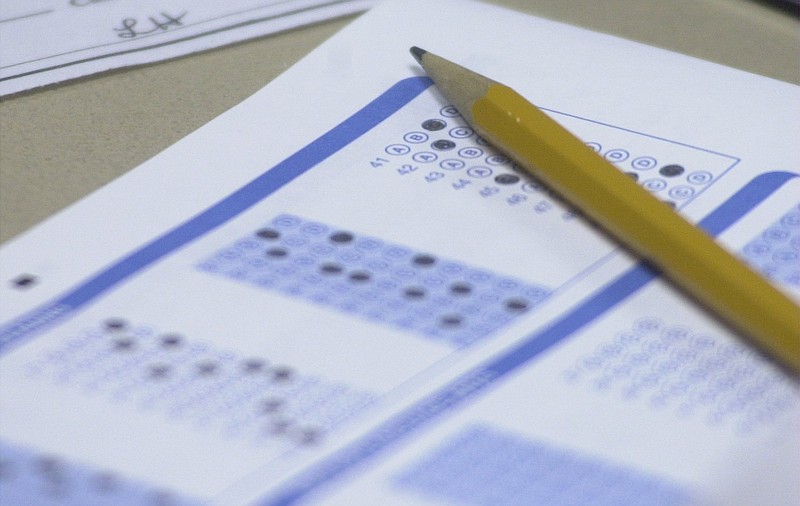Tennessee students' scores are stagnating, like those in most other states assessed in the Nation's Report Card.
The lack of significant change means there is more work to be done, according to state officials.
Tennessee's fourth and eighth graders scored near average in math and reading on the National Assessment of Educational Progress, according to a new federal report released Wednesday. The state was among 34 states that did not show significant changes in student achievement, according to the report.
After seeing significant growth from 2011 to 2013, the overall percentage of Tennessee students showing proficiency in these subjects has not shown consistent improvement, said Tennessee Education Commissioner Penny Schwinn in a conference call Tuesday.
"We are proud of how far we've come, but we know that it is not far enough for our kids. We need to go further, and now is the time to accelerate again," Schwinn said.
NAEP RESULTS
Students take the assessment on a computer or tablet and receive a score out of 500.Below are local state’s averages compared to national averages.TENNESSEEMath Scores/National Average:— 4th grade: 240/240— 8th grade: 280/281Reading Scores:— 4th grade: 219/219— 8th grade: 262/262GEORGIAMath Scores:— 4th grade: 238/240— 8th grade: 279/281Reading Scores:— 4th grade: 218/219— 8th grade: 262/262ALABAMAMath Scores:— 4th grade: 230/240— 8th grade: 269/281Reading Scores:— 4th grade: 212/219— 8th grade: 253/262Source: The 2019 Nation’s Report Card
Tennessee has previously come under scrutiny for lax grade-level standards and mismatched results between the state's TCAP and TNReady assessments versus the results of National Assessment of Educational Progress testing. Even as student scores on Tennessee tests continued to improve, NAEP scores in many subjects remained stagnant for decades.
In 2015, Ken Chilton, former director of Ochs Center for Metropolitan Studies, told the Times Free Press that "TCAP is nowhere near basic proficiency by NAEP standards; in fact, it is at the bottom in all tests examined."
Since then the Department of Education worked to create more rigorous standards for assessments under former Education Commissioner Candice McQueen. Regardless, Schwinn acknowledged Tuesday that only about 30-40% of Tennessee students are on track for future grade level and college and career success.
In 2019, only fourth grade math scores showed significant growth since 2017, with 40% of Tennessee students scoring proficient or above on the assessment - up from 36% in 2017. The 2019 score was on par with the national average of 40% of fourth graders scoring proficient or above.
For eighth graders, only 31% scored proficient or above, up from 29% in 2017 and compared to 33% nationally.
Reading scores, which have been under scrutiny over the years due to Tennessee's emphasis on literacy under previous Department of Education administrations, also showed little improvement.
Only 32% of eighth graders tested at or above proficient in 2019, up from 31% in 2017 and only about a third, or 35%, of fourth graders scored proficient or above in 2019, compared to 33% in 2017.
Statistically, Tennessee students did not perform much better than national peers, though nationally only about 32% of fourth grade students score proficient or above in reading.
Tennessee is not alone, though.
Peggy Carr, associate commissioner for the Assessments Division for the National Center for Education Statistics, which releases the report card, told reporters that reading scores declined among both fourth and eighth graders across the country - after being largely stagnant for decades.
"In reading, we see score declines in both grades," Carr said, including a 1-point decline in Grade 4 and a 3-point decline in Grade 8 compared to 2017. "Our students are struggling the most with reading and are basically where they were nearly 30 years ago."
"There is a clear pattern," Carr continued. "We are seeing more progress for math than we are seeing for reading. Reading has more or less plateaued or is stagnant, there's not a lot of improvement and we have lost considerable ground in this last assessment for reading in eighth grade particularly."
Carr noted that the most significant pattern is that higher-performing students are seeing growth and improvement, whereas the performance of lower-performing students is declining. This further perpetuates achievement gaps between high performers and those who are not performing as well.
National Assessment of Educational Progress scores do not correlate with grade levels or even indicate grade level proficiency, she cautioned, but rather are "intended to be an ambitious goal indicating mastery of the content."
Also, not all students take the assessments. Only about 600,000 students across the country take the assessments, which are meant to be a representative sample of public school and private Catholic school students. Participation wasn't high enough among other private schools, NAEP officials said. This year, 12,500 students took the tests in Tennessee, 9,200 students in Alabama were tested and 13,800 participated in Georgia.
Two different types of reading are measured - reading for information and reading for literary experience - and nationally, student scores are declining faster in reading for literary experiences.
The skills those scores measure include students understanding or making inferences from the text they are reading or being able to analyze the texts.
Schwinn said Tennessee state officials are disappointed in the state's English/Language Arts performance "across the board" and especially on NAEP and TNReady.
Literacy will be one of the main pillars of the commissioner's new strategic plan that will be rolled out in coming months. Overarching themes of the plan have been reported on, but the full plan has not been disclosed publicly yet.
Schwinn also hinted at significant focus to be placed on "the whole child," as well as a new model for school turnaround work, which was mentioned at Monday night's state education department listening tour at Brainerd High School.
Contact Meghan Mangrum at mmangrum@timesfreepress.com or 423-757-6592. Follow her on Twitter @memangrum.
